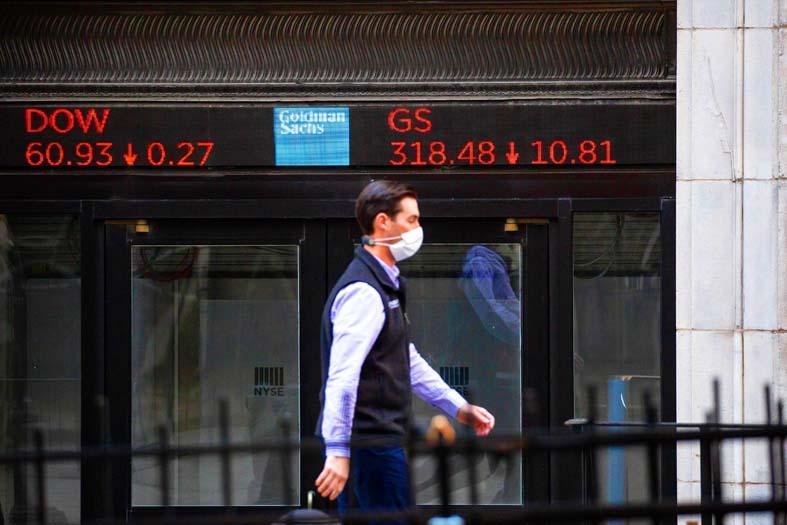Goldman Sachs Group Inc is seeing substantial demand for digital assets from institutions as it works to restart its cryptocurrency trading desk.
In a survey of nearly 300 clients by the firm, 40 percent have exposure to crypto, said Matt McDermott, global head of digital assets for Goldman Sachs Global Markets Division, speaking on a podcast.
The situation is different now compared with the 2017 bitcoin bubble, due to “huge” institutional demand across different industry types and from private banking clients, he said.

Photo: Michael Nagle, Bloomberg
McDermott confirmed plans reported last week for Goldman to restart its crypto trading desk, which he said would be “quite narrow initially,” with a focus on areas such as CME Group Inc futures.
He said that US banks need to cope with regulations that bar them from trading physical cryptocurrencies.
Cryptocurrency enthusiasts argue that digital tokens and the underlying blockchain technology are gaining acceptance among more mainstream institutions.
The derivatives market and new investment products have made digital assets more easily accessible. Some strategists posit that the asset class is a potential diversifier for portfolios, while others are more skeptical and blame speculators for inflating a possible bubble in bitcoin and other cryptos.
Bitcoin yesterday rose as much as 3.4 percent in Asia, while ether gained as much as 5.3 percent to the highest since Feb. 23.
Blockchain technology offers “a real diverse set of opportunities for the financial industry,” McDermott said.
As for prices, 76 percent of those surveyed see bitcoin ending this year between US$40,000 and US$100,000, McDermott said.
However, 22 percent expect it to end the year above US$100,000.

Sweeping policy changes under US Secretary of Health and Human Services Robert F. Kennedy Jr are having a chilling effect on vaccine makers as anti-vaccine rhetoric has turned into concrete changes in inoculation schedules and recommendations, investors and executives said. The administration of US President Donald Trump has in the past year upended vaccine recommendations, with the country last month ending its longstanding guidance that all children receive inoculations against flu, hepatitis A and other diseases. The unprecedented changes have led to diminished vaccine usage, hurt the investment case for some biotechs, and created a drag that would likely dent revenues and

Global semiconductor stocks advanced yesterday, as comments by Nvidia Corp chief executive officer Jensen Huang (黃仁勳) at Davos, Switzerland, helped reinforce investor enthusiasm for artificial intelligence (AI). Samsung Electronics Co gained as much as 5 percent to an all-time high, helping drive South Korea’s benchmark KOSPI above 5,000 for the first time. That came after the Philadelphia Semiconductor Index rose more than 3 percent to a fresh record on Wednesday, with a boost from Nvidia. The gains came amid broad risk-on trade after US President Donald Trump withdrew his threat of tariffs on some European nations over backing for Greenland. Huang further

CULPRITS: Factors that affected the slip included falling global crude oil prices, wait-and-see consumer attitudes due to US tariffs and a different Lunar New Year holiday schedule Taiwan’s retail sales ended a nine-year growth streak last year, slipping 0.2 percent from a year earlier as uncertainty over US tariff policies affected demand for durable goods, data released on Friday by the Ministry of Economic Affairs showed. Last year’s retail sales totaled NT$4.84 trillion (US$153.27 billion), down about NT$9.5 billion, or 0.2 percent, from 2024. Despite the decline, the figure was still the second-highest annual sales total on record. Ministry statistics department deputy head Chen Yu-fang (陳玉芳) said sales of cars, motorcycles and related products, which accounted for 17.4 percent of total retail rales last year, fell NT$68.1 billion, or

MediaTek Inc (聯發科) shares yesterday notched their best two-day rally on record, as investors flock to the Taiwanese chip designer on excitement over its tie-up with Google. The Taipei-listed stock jumped 8.59 percent, capping a two-session surge of 19 percent and closing at a fresh all-time high of NT$1,770. That extended a two-month rally on growing awareness of MediaTek’s work on Google’s tensor processing units (TPUs), which are chips used in artificial intelligence (AI) applications. It also highlights how fund managers faced with single-stock limits on their holding of market titan Taiwan Semiconductor Manufacturing Co (TSMC, 台積電) are diversifying into other AI-related firms.